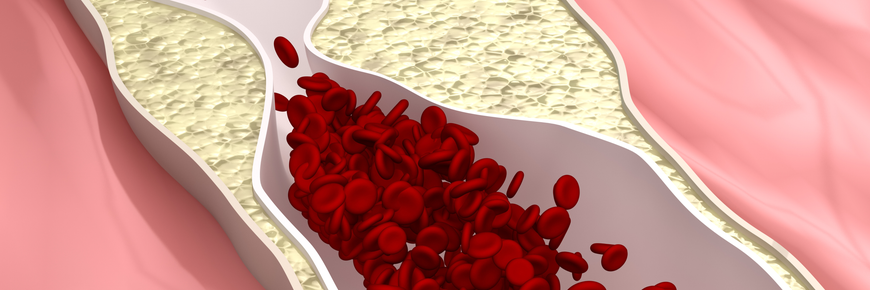- Home
- Weet-Bix™ Cholesterol Lowering
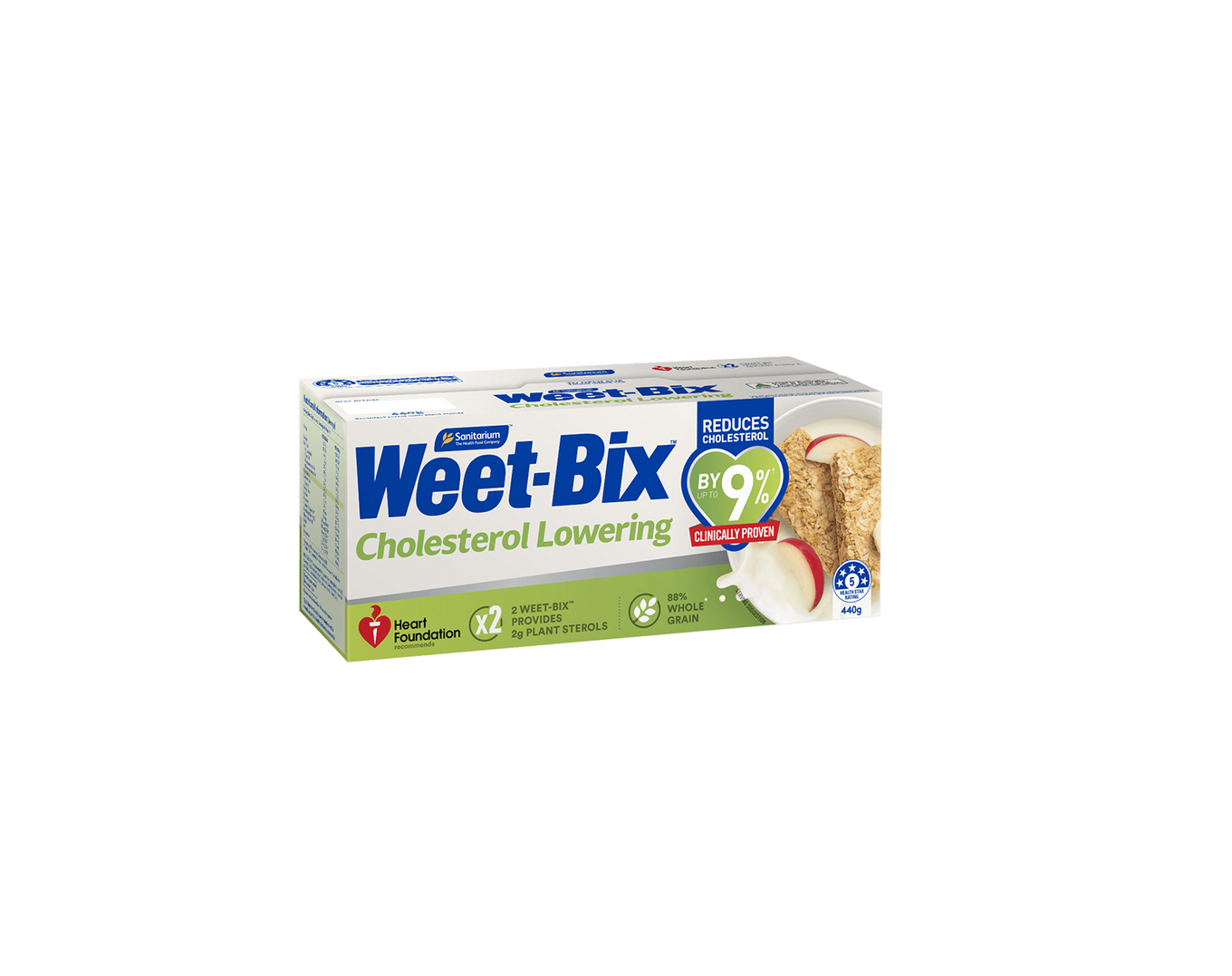
Weet-Bix™ Cholesterol Lowering
The following information is intended for Health Care Professionals
Key benefits of Weet-Bix™ Cholesterol Lowering
Prof Peter Clifton – clinical trial results & heart health facts
Statistics Evidence
View and download our free Factsheets: For Health Professionals click here and for Consumers click here
Recommendations: National Heart Foundation
Approval by Food Standards Australia New Zealand (FSANZ)
International plant sterol dietary recommendations
For product information click here
Visit our Take Two a Day Website for a simple low down on all things Weet-Bix™ Cholesterol Lowering
Check out these delicious recipes using Weet-Bix™ Cholesterol Lowering
References
Weet-Bix™ Cholesterol Lowering key benefits — It’s effective, it’s easy, it’s enjoyable and supported by the Heart Foundation
It’s Effective: Weet-Bix™ Cholesterol Lowering is effective—the 2 grams of plant sterols in a daily serve of Weet-Bix™ Cholesterol Lowering is clinically proven to actively lower LDL cholesterol levels by up to 9% in 4 weeks as part of a healthy diet low in saturated fat.
Research shows, based on 40 clinical studies published in peer reviewed journals, that consuming 2 grams of plant sterols daily lowers LDL cholesterol by up to 9% [1]. 2 grams of plant sterols in Weet-Bix™ Cholesterol Lowering, consumed daily has been clinically verified, is aligned to the total body of evidence and lowered LDL cholesterol by up to 9% in 4 weeks [1, 2].

Over the course of my career we have learnt a lot about heart health and the important role that diet and lifestyle plays. I conducted a clinical trial in partnership with Sanitarium Health and Wellbeing™ and their breakfast cereal product Weet-Bix™ Cholesterol Lowering.
"My research team and I conducted a clinical trial in 2016. The trial included 46 Australian adults with high cholesterol (>5.5mmol/L), that we divided into two randomly assigned groups. One group ate 2 Weet-Bix™ Cholesterol Lowering a day for 4 weeks. The other group ate 2 regular Weet-Bix™ as the placebo control group for the same time period. We then swapped the treatments over for the next 4 weeks.”
The randomised clinical study on Weet-Bix™ Cholesterol Lowering, conducted by the University of South Australia with lead researcher Professor Peter Clifton, concluded that 2 grams of plant sterols from 2 Weet-Bix™ (one serve) per day significantly lowers LDL cholesterol.
The LDL cholesterol lowering efficacy reported in the Weet-Bix™ Cholesterol Lowering clinical study was aligned with (not significantly different from) the LDL cholesterol lowering efficacy of the most up-to-date analysis of all available clinical studies of products using a similar dose of plant sterols [delivering 2-2.5g/d (average 2.1g/d) of plant sterols] [1].
View the peer-reviewed clinical trial in the Journal of Foods - "Cholesterol-Lowering Effects of Plant Sterols in One Serve of Wholegrain Wheat Breakfast Cereal Biscuits—a Randomised Crossover Clinical Trial".
See the Peter Clifton resources.
It’s Easy: Weet-Bix™ Cholesterol Lowering is easy—eating just two Weet-Bix™ Cholesterol Lowering daily, provides the optimal amount of 2 grams of plant sterols in one serve.
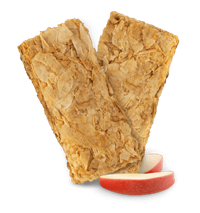
It’s Enjoyable: Weet-Bix™ Cholesterol Lowering is enjoyable with the same great taste as the regular Weet-Bix™ Australians know and love.
In the Weet-Bix™ Cholesterol Lowering clinical study, simply eating 2 Weet-Bix™ (one serve) per day was found to improve measures of diet quality including wholegrain (increased by 33%), thiamine (37%), riboflavin (28%), niacin (13%) and iron (27%)[2]. Fibre, fat, protein, carbohydrate and energy did not change. Close to half (47%) of the participants could not identify the product containing plant sterol [2]. For the nutritional information and frequently asked questions on Weet-Bix™ Cholesterol Lowering visit the product page. For more information on the role of wholegrains in overall health and their specific role in heart health visit Grains & Legumes Nutrition Council.
It’s supported by the Heart Foundation: together with a healthy balanced diet, the Heart Foundation recommends that people with elevated LDL cholesterol consume 2-3 grams of plant sterols every day from plant sterol enriched foods [3].
Back to top
Prof Peter Clifton – clinical trial results & heart health facts
The following videos were developed for Health Professionals. They include an expert who will answer questions about cholesterol and heart health, plant sterols, and Weet-Bix™ Cholesterol Lowering.
1. Introduce yourself, your academic and professional experience and why heart health is important to you?- My name is Professor Dr. Peter Clifton. I’m a Professor of Nutrition at the University of South Australia and a general physician. I have over 30 years experience researching the prevention and treatment of cardiovascular diseases, type 2 diabetes, obesity and other metabolic conditions.
- Over the course of my career we have learnt a lot about heart health and the important role that diet and lifestyle plays. I recently conducted a clinical trial in partnership with Sanitarium and their new product Weet-Bix Cholesterol Lowering.
2. What were your key findings from the Weet-Bix Cholesterol Lowering clinical trial?
- My research team and I conducted a clinical trial in 2016. The trial included 46 Australian adults with high cholesterol (on screen as super: >5.5mmol/L), that we divided into two randomly chosen groups. One group ate 2 Weet-Bix Cholesterol Lowering a day for 4 weeks. The other group ate 2 regular Weet-Bix as the placebo control group for the same time period. We then swapped the treatments over for the next 4 weeks.
- Not only did we find that Weet-Bix Cholesterol Lowering effectively lowered LDL cholesterol by up to 9% within 4 weeks. We also established, that by simply eating 2 Weet-Bix Cholesterol Lowering per day some diet quality measures including daily wholegrain intake, as well as thiamine, riboflavin, niacin and iron were increased.
- Overall, the study supported Weet-Bix Cholesterol Lowering as being an effective, easy and nutritious food for people with high cholesterol.
3. What is cholesterol?
- Cholesterol is a waxy fat that is produced in the body by all cells. It is an essential building block in the human body and plays a key role in many metabolic processes, including maintaining cells and production of hormones.
- There are two types of cholesterol:
1. LDL or "Bad" cholesterol which is the main cause of narrowing of the blood vessels when it is high.
2. HDL or "Good" cholesterol that actually works to clear cholesterol from cells. - While our bodies need cholesterol, if there is too much cholesterol in the blood, it can build up in the walls of your arteries causing narrowing of the blood vessels, which may then become a problem for your heart health.
4. What are the key factors for a healthy heart?
- Diet and lifestyle plays a key role in helping manage your heart health. Positive lifestyle changes, such as eating a balanced diet, regular physical activity, maintaining a healthy weight and not smoking are all important things you can do to help maintain a healthy heart.
5. What are Plant Sterols and how do they work?
- Plant sterols are found naturally in very small quantities in a variety of plant foods such as grains, vegetables, fruit, legumes, nuts and seeds.
- They are clinically proven to actively lower cholesterol by partially blocking the absorption of cholesterol in the digestive system.
- 2 grams of plant sterols consumed on a daily basis from plant sterols enriched foods is proven to lower cholesterol by up to 9%.
6. Why is Cholesterol Important?
- Studies have shown, convincingly, that there is a very strong association between cholesterol levels and a healthy heart, along with other lifestyle elements such as overall diet, high blood pressure, weight and activity levels.
- Lowering our bad “LDL” cholesterol by simple dietary changes helps manage your heart health.
- Too much bad fat (saturated and trans fat) can increase LDL cholesterol. Replacing bad fats with good fats (polyunsaturated and monounsaturated) and wholegrains can help manage your cholesterol.
- The only way of knowing your cholesterol levels is to have a blood test. Ask your GP to have your cholesterol tested. For more specific dietary advice on cholesterol management, speak to a Dietitian.
7. What causes high cholesterol?
- There are many factors which can affect your LDL or bad cholesterol. Age, genes, weight, diet and lifestyle.
8. What is the incidence of elevated cholesterol in AU and NZ?
- What we know is that 1 in 3 Australian adults have elevated cholesterol. Lowering cholesterol is important for heart health.
9. Why is it important to take care of your Heart Health and Check your Cholesterol?
- Observational studies which have followed large populations over 20, 25, 30 years clearly show the important role that cholesterol plays in heart health. Achieving and maintaining lower cholesterol levels over the long term helps to maintain heart health.
- As the processes that underlie your heart’s health, such as the narrowing of the blood vessels, can start much earlier in life than people may think, it’s important to look after your heart health from an early age by achieving and maintaining the desirable cholesterol levels.
- And it’s a similar story for other lifestyle factors for heart health like high blood pressure, smoking, overweight, a sedentary lifestyle and poor diet … the earlier you take action the better the long term outcomes.
- Regular cholesterol checks should therefore be part of our health routine.
10. What is the role of Diet and Lifestyle on your Heart Health?
- Adopting a diet that emphasises a variety of vegetables, fruits, legumes, wholegrain cereals and breads, nuts and seeds, and healthy fats every day are important to help manage your heart health.
- Other healthy lifestyle factors; such as not smoking, maintaining an active lifestyle and healthy weight, are also important to help manage the health of your heart.
- The most effective cholesterol lowering dietary strategies are to replace saturated and trans fats (bad fats) with unsaturated fats (healthy fats) and by increasing your intake of plant sterols each day, as part of a healthy diet.
- These two strategies account for the majority of the cholesterol lowering effect that is achievable through diet: A daily intake of 2 grams of plant sterols from plant sterol enriched food is proven to lower cholesterol by up to 9%. Replacing saturated and trans fats with unsaturated fats has the potential to lower LDL “bad” cholesterol by around 6-8%.
11. International & National Recommendations for the Management of Cholesterol
- Lowering cholesterol is recognised by leading health authorities as an important contributor to heart health and is recommended here and overseas.
- Plant sterols have been proven to lower LDL or “bad” cholesterol, in over 40 clinical studies published in peer reviewed journals.
- The Heart Foundation recommends that people with elevated LDL cholesterol eat 2–3 grams of plant sterols each day from plant sterols enriched food, such as breakfast cereals and spreads.
- There is also evidence that the cholesterol lowering benefits of plant sterols are additive to statins therapy, so the Heart Foundation also recommends that people taking statins can benefit from eating plant sterol enriched foods in addition to statin therapy.
- People are encouraged to have their cholesterol tested by their GP, to help take a positive step in helping manage your heart health.
12. What does Weet-Bix Cholesterol Lowering mean for Aussie consumers?
- It’s well known that 1 in 3 Australian adults are diagnosed with high cholesterol. Sanitarium’s commitment to developing a breakfast cereal like Weet-Bix Cholesterol Lowering that’s easy to use and effective in lowering cholesterol, in my opinion, represents a real benefit for consumers and shows Sanitarium is genuine in its mission to improve Australian’s health and wellbeing.
Heart health statistics
Heart health is a serious issue for over 4 million Australians [4]. More than 1 in 3 Australian adults have elevated cholesterol [5, 6]. The 2016 Australian Health Report states that 63% of Australia adults (8.5 million) have dyslipidaemia (abnormal levels of cholesterol and triglycerides), and this statistic goes up to 81% for adults 65-74 years old, and most of those are not on statins. As stated above, 1 in 3 (33%) have elevated cholesterol [6].
Heart health evidence: the role of diet and lifestyle on your heart
A number of large, long-term studies clearly show the important role that elevated cholesterol plays in heart health [7--10]. Lowering cholesterol is recognised by leading health authorities as an important contributor to heart health [11]. Adopting a diet every day that emphasises a variety of wholegrain cereals and breads, vegetables, fruits, legumes, including soy, nuts and seeds, soluble fibre and healthy fats are important to help manage your heart health. Other healthy lifestyle factors; such as not smoking, maintaining an active lifestyle and a healthy weight, are also important to help manage the health of your heart [11].
The most effective cholesterol lowering dietary strategies are replacing saturated and trans fats with unsaturated fats, and daily intake of plant sterols, as part of a healthy diet [12, 13]. These two strategies account for the majority of the cholesterol lowering effect that is achievable through diet. A daily intake of 2 grams of plant sterols from plant sterol enriched foods, as part of a healthy diet and lifestyle, has proven to lower LDL cholesterol by up to 9% [1].
Replacing saturated and trans fats with unsaturated fats has the potential to further lower LDL cholesterol by around 6-8% [14]. The effects of plant sterols from enriched foods are additive to those of a healthy diet. So in combination, plant sterols and choosing healthy fats in place of saturated fat have the potential to lower LDL cholesterol by about 15% [11, 12]. With even further benefits to cholesterol lowering by adopting healthy plant-based foods. Sanitarium promotes a diet rich in whole plant-based foods for optimising your health.
As the processes that underlie your heart’s health, such as the narrowing of the blood vessels, can start much earlier in life than people may think, it’s important to look after your heart health from an early age by achieving and maintaining the desirable cholesterol levels. And it’s a similar story for other lifestyle factors for heart health like high blood pressure, smoking, overweight, a sedentary lifestyle and poor diet—the earlier you take action the better the long-term outcomes. Regular cholesterol checks should therefore be part of our health routine. Take a positive step and discuss with your General Practitioner today. For more specific dietary advice on cholesterol management, speak to an Accredited Practising Dietitian (APD).
Back to top
For more information, download a copy of our Consumer Fact Sheet and Health Professional Fact Sheets below.
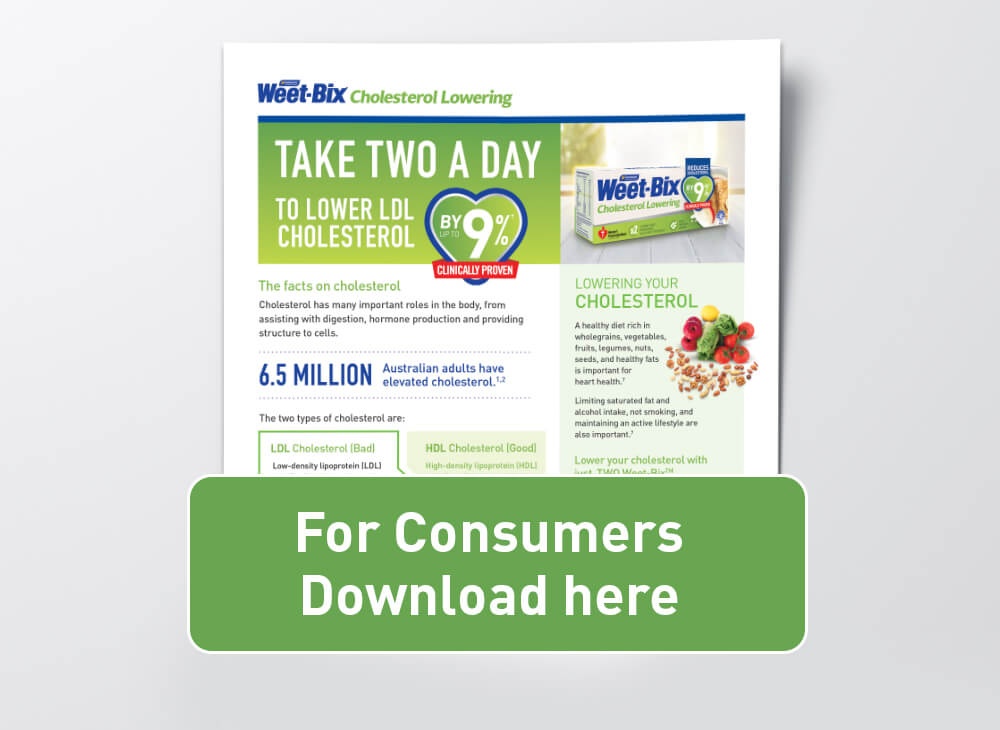 | 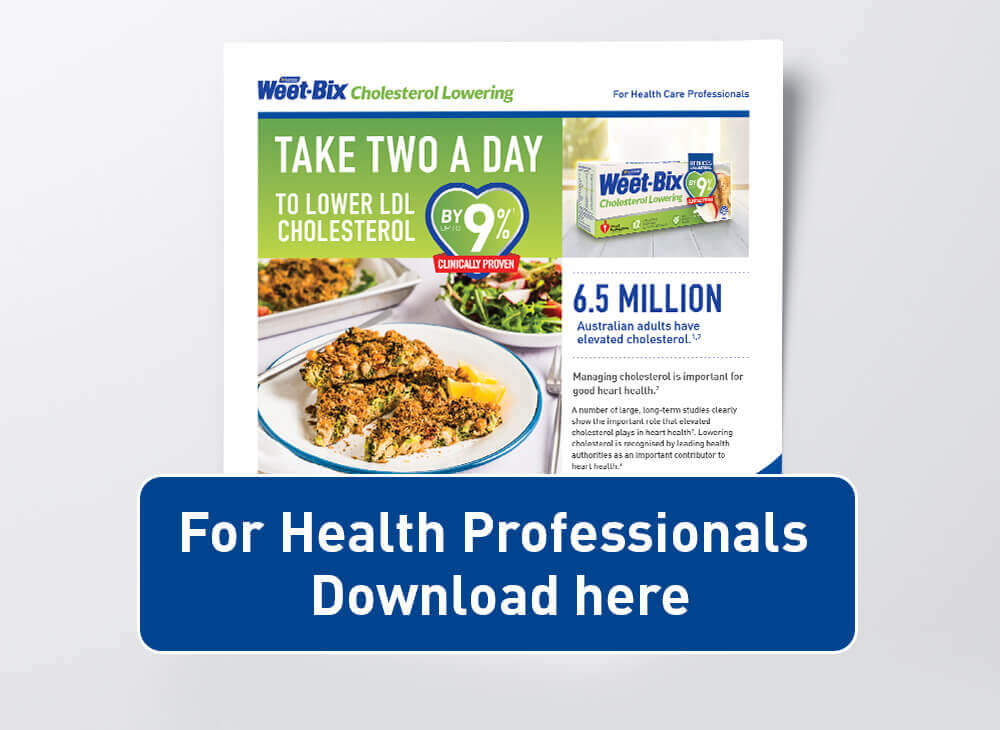 |
National Heart Foundation of Australia—the heart health experts
.png)
The Heart Foundation recommends that people with elevated LDL cholesterol eat 2–3 grams of plant sterols each day from plant sterol enriched foods, together with a healthy balanced diet [3]. Read more about the role of plant sterol enriched foods for lowering cholesterol and managing heart health in the Heart Foundation’s Dietary Position Statement on Phytosterol/stanol Enriched foods & Heart Healthy Foods.
The Heart Foundation supports the 2 grams of plant sterols per serve of Weet-Bix™ Cholesterol Lowering as part of a healthy diet to help lower cholesterol.
The cholesterol lowering benefits of plant sterols are additive to statins therapy, so the Heart Foundation also recommends that people taking statins can benefit from eating plant sterol enriched foods in addition to statin therapy [3].
The Heart Foundation recommends that Health Professionals advise Australian adults on statin therapy about the benefits of consuming plant sterol-enriched foods. For more diet and lifestyle information on how to help manage your heart health visit the Heart Foundation website.
Back to top
Food Standards Australia New Zealand (FSANZ) approved an increased level of plant sterols in breakfast cereals
.png)
Sanitarium’s Weet-Bix™ Cholesterol Lowering breakfast cereal, demonstrates the Company’s commitment to investing in innovative food solutions to help Australians to experience better health. In another first, Sanitarium achieved an update to the Food Standards Code for Australia & New Zealand (FSANZ) which allowed up to 2 grams of plant sterols to be included in a serve of breakfast cereal.
Sanitarium’s Weet-Bix™ Cholesterol Lowering was Australia’s first breakfast cereal proven to significantly lower cholesterol in a single serve. At the time of launch in 2017, Weet-Bix™ Cholesterol Lowering was the only breakfast cereal and food on the market to contain 2 grams of plant sterols in a serve with exclusive permission in the Food Standards Code for Australia and New Zealand for up to 1 year.After an extensive review and public consultation, FSANZ confirmed the safety of plant sterols and recognised the potential public health benefit of offering consumers an easy and effective way to reduce cholesterol via 2 grams plant sterols per serving of breakfast cereal. This has given Sanitarium the ability to deliver an effective dose of plant sterols per serve and create Weet-Bix™ Cholesterol Lowering.
Back to top
International plant sterol dietary recommendations
Lowering cholesterol is recognised by leading health authorities as an important contributor to heart health and include plant sterols in their dietary recommendations for cholesterol management. Evidence-based dietary recommendations for the management of cholesterol and support of heart health have been developed by several international authorities and many of these now include plant sterol dietary recommendations. Some include the European Society of Cardiology, European Atherosclerosis Society National Heart Foundation of New Zealand, American Heart Association, Health Canada, Dutch Heart Foundation, British Heart Foundation and Nutrition Foundation of Italy. People are encouraged to have their cholesterol tested by their General Practitioner, to take a positive step in helping manage heart health. For specific dietary advice on cholesterol management, speak to an Accredited Practising Dietitian (APD).Last Updated: May 2023†Two Weet-Bix™ Cholesterol Lowering daily provides 2g of plant sterols, which are clinically proven to lower LDL cholesterol by up to 9% in 4 weeks as part of a healthy diet low in saturated fat.
Weet-Bix™ Cholesterol Lowering may not be suitable for children under 5 years and pregnant and lactating women.
Individual results may vary due to diet, genetic or other reasons
REFERENCES
- Ras, R.T., J.M. Geleijnse, and E.A. Trautwein, LDL-cholesterol-lowering effect of plant sterols and stanols across different dose ranges: a meta-analysis of randomised controlled studies. Br J Nutr, 2014. 112(2): p. 214-9. https://www.ncbi.nlm.nih.gov/pmc/articles/PMC4071994/
- Clifton, P.; Keogh, J. Cholesterol-Lowering Effects of Plant Sterols in One Serve of Wholegrain Wheat Breakfast Cereal Biscuits—A Randomised Crossover Clinical Trial. Foods 2018, 7, 39. https://doi.org/10.3390/foods7030039
- Heart Foundation. (2017). Position Statement: Phytosterol/ stanol enriched foods & Heart Health Foods. National Heart Foundation of Australia. [cited 2023 15 May]; Available from 190729_Nutrition_Position_Statement_-_Phyto_Sterol.pdf (heartfoundation.org.au)
- Australian Bureau of Statistics. Australian Health Survey: Biomedical Results for Chronic Diseases. Canberra: ABS; 2011.
- Australian Bureau of Statistics, Australian Health Survey: Biomedical results for chronic diseases. 2011-12, Commonwealth of Australia: Canberra, ACT.
- Australian Institute of Health and Welfare, Australia's Health 2016. 2016, AIHW: Canberra, ACT.
- Huxley, R., S. Lewington, and R. Clarke, Cholesterol, coronary heart disease and stroke: a review of published evidence from observational studies and randomized controlled trials. Semin Vasc Med, 2002. 2(3): p. 315-23.7.
- Catapano, A.L., et al., 2016 ESC/EAS Guidelines for the Management of Dyslipidaemias. European Heart Journal, 2016. 37: p. 2999-3058.
- Cholesterol Treatment Trialists, C., et al., Efficacy and safety of LDL-lowering therapy among men and women: meta-analysis of individual data from 174,000 participants in 27 randomised trials. Lancet, 2015. 385(9976): p. 1397-405.
- Cholesterol Treatment Trialists, C., et al., The effects of lowering LDL cholesterol with statin therapy in people at low risk of vascular disease: meta-analysis of individual data from 27 randomised trials. Lancet, 2012. 380(9841): p. 581-90.
- National Vascular Disease Prevention Alliance. Guidelines for the management of absolute cardiovascular disease risk. 2012 [cited 2023 15 May]; Available from: https://www.heartfoundation.org.au/getmedia/4342a70f-4487-496e-bbb0-dae33a47fcb2/Absolute-CVD-Risk-Full-Guidelines_2.pdf
- Clifton, P., et al., Dietary intervention to lower serum cholesterol. Aust Fam Physician, 2009. 38(6): p. 424-9.
- Clifton, P., Lowering cholesterol - a review on the role of plant sterols. Aust Fam Physician, 2009. 38(4): p. 218-21.
- Mensink, R.P., et al., Effects of dietary fatty acids and carbohydrates on the ratio of serum total to HDL cholesterol and on serum lipids and apolipoproteins: a meta-analysis of 60 controlled trials. Am J Clin Nutr, 2003. 77(5): p. 1146-55.



